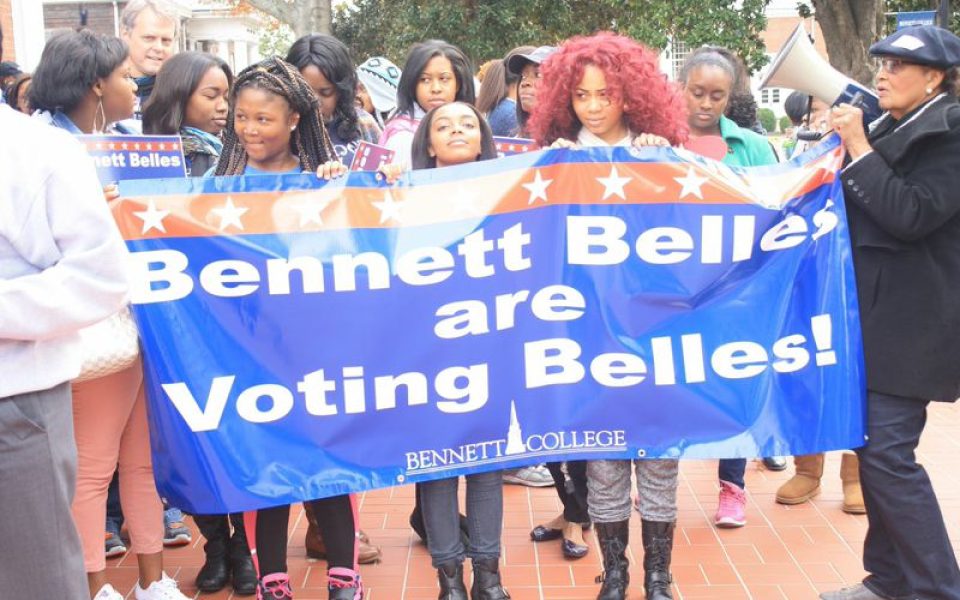This story was originally published by Education NC on Dec. 16. Story by Rupen R. Fofaria.
The fate of the IGNITE HBCU Excellence Act is especially relevant to North Carolina’s 10 Historically Black Colleges and Universities, which enroll the nation’s highest number of HBCU students.
With the U.S. House of Representatives set to swing from a five-seat Democrat advantage to a nine-seat Republican one in 2023, many are watching to see if the House will try to pass the bill in a lame-duck session before the end of the year.
“The IGNITE HBCU Excellence Act is the most transformative legislation for Historically Black Colleges and Universities ever,” U.S. Rep. Alma Adams, D-District 12, said when she introduced the bill. “For over 150 years, HBCUs have been agents of equity, access, and excellence in education, despite being ignored and marginalized by federal and state governments. This historic, bipartisan bill changes that.”
One fellow Democrat and two Republicans joined Adams in introducing the bill. Here’s what is in it, and what it would mean for the NC10.
What’s in the bill for HBCUs?
Adams, a staunch HBCU advocate and 1968 graduate of North Carolina A&T State University, filed the IGNITE HBCU Excellence Act in May 2021. The bill received 219 supporters, giving it a slight majority among the 435-member chamber. Its supporters include 19 Republicans and seven of the 13 delegates from North Carolina.

The bill establishes a grant program to support long-term improvements and graduate programs at HBCUs. In September, Adams filed a new bill that would expand support to other Minority-Serving Institutions (MSIs), like Hispanic-Serving Institutions (HSIs), Predominantly Black Institutions (PBIs), and Tribal Colleges and Universities (TCUs).
The bill would require the U.S. Department of Education to award grants to these institutions to improve campus facilities and strengthen campus safety and security, the latter of which is an urgent and concerning need after recent bomb threats at HBCUs across the country and this state.
Funds could also help institutions update research facilities. There are currently no HBCUs with an “R1” research designation, the highest level of research activity, and Adams said IGNITE could provide funds for these institutions to update research facilities to achieve the prestigious designation.
Grants could also go toward constructing buildings for new programs, improving on-campus dorms, and giving long-neglected buildings a facelift.
The IGNITE bill does not include a specific funding allocation, so funding would depend on annual appropriations. Lawmakers seem open to that. President Joe Biden’s budget proposal included $450 million in funds for four-year HBCUs, TCUs, and MSIs to expand research and development capabilities. The House budget proposal did not match that figure but was more than half of Biden’s proposal.
It could help more than just the HBCUs
In North Carolina, there are 10 accredited HBCUs:
- Shaw University
- St. Augustine’s University
- Johnson C. Smith University
- Fayetteville State University
- Bennett College
- Livingstone College
- North Carolina A&T State University
- Elizabeth City State University
- Winston-Salem State University
- North Carolina Central University
There are also several MSIs, HSIs, and TCUs. Based on data from 2020, these include:
- Robeson Community College
- Sampson Community College
- Bladen Community College
- University of North Carolina at Pembroke
- Chowan University
- Edgecombe Community College
- Halifax Community College
- North Carolina Wesleyan College
The institutions, and particularly the NC10, serve a significant portion of historically underserved communities. While only representing roughly 3% of all four-year colleges and universities, HBCUs produce about 17% of all bachelor’s degrees awarded to Black people. HBCUs enroll a disproportionately high percentage of first-generation and low-income students – nearly 60% – and outperform their peers in supporting and graduating these students.
In North Carolina, HBCUs make up 16% of four-year universities in the state, yet they enroll 45% of the state’s Black undergraduate students. The NC10 produce the majority of educators of color and collectively have a $2 billion economic impact on the state.
Why does it matter?
The NC10 are doing this despite a history of being underfunded at the federal and state level.
According to the Government Accountability Office (GAO), there are “extensive and diverse” capital project needs at the HBCUs. Of the 101 accredited HBCUs, 79 responded to the GAO’s survey. Of that number, 70 reported significant capital needs, including several in North Carolina.
Last year, the Center for Racial Equity in Education (CREED) published a report, Listening to the NC10, resulting from visits, interviews, and surveys with each of the state’s accredited HBCUs. Among the report’s findings:
A major theme from nearly every school visited as part of the Listening Tour was the need for better infrastructure. From classroom buildings, dormitories, student amenities, technology needs, and other spaces, HBCUs across the state report infrastructure issues that impede their mission, recruitment and retention. Funding for deferred maintenance or renovation and repairs on existing facilities, some of which qualify as historic landmarks, is not sufficient for providing the quality of experience students and faculty at HBCUs deserve.
Join the First Amendment Society, a membership that goes directly to funding TCB‘s newsroom.
We believe that reporting can save the world.
The TCB First Amendment Society recognizes the vital role of a free, unfettered press with a bundling of local experiences designed to build community, and unique engagements with our newsroom that will help you understand, and shape, local journalism’s critical role in uplifting the people in our cities.
All revenue goes directly into the newsroom as reporters’ salaries and freelance commissions.


Leave a Reply